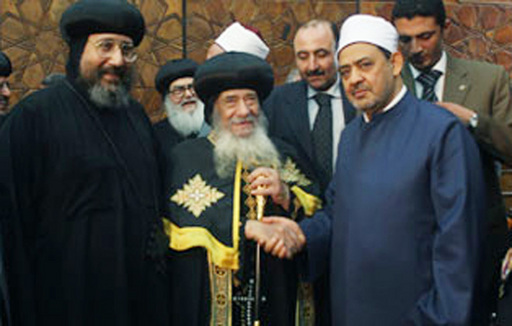 Last Sunday saw President Mubarak give his inaugural speech before Parliament for the new parliamentary round. Egyptians awaited the speech eagerly since it was expected to offer clear indications on the upcoming legislative agenda and the presidential assignment to the government in the new legislative term. In short, it offered a preview of the bills that would in all probability be placed before Parliament to pass into laws.
Last Sunday saw President Mubarak give his inaugural speech before Parliament for the new parliamentary round. Egyptians awaited the speech eagerly since it was expected to offer clear indications on the upcoming legislative agenda and the presidential assignment to the government in the new legislative term. In short, it offered a preview of the bills that would in all probability be placed before Parliament to pass into laws.
Copts and Muslims …the difference remains
Youseef Sidhom
Opinion
00:12
Sunday ,26 December 2010

The President reviewed the internal and external national effort, achievements, hopes, anticipations, and challenges. The targets and bills which he said he would place before Parliament confirmed that Egypt was bent on achieving growth and modernisation. The immediate priority was to focus on making life easier for the hard-working average Egyptian, to solve ingrained problems and ensure a better future for our children.
Legislation and national planning, the President said, should all stem from the major focal point that Egypt is a modern, moderate State established on a foundation of national unity, justice, and equality. He said social and economic development should target sustainable growth rates of six to eight per cent annually; he tackled the bills for development of education, health care, and decentralised government, nuclear power, water security, and preservation of underground water.
On the foreign policy front, the President confirmed Egypt’s stance regarding the support of a solution for the Palestinian cause, as well as stability in Iraq, Sudan, Yemen and Lebanon. He repeatedly said: “What we say publicly is what we say behind closed doors.”
If the government succeeds in translating the President’s programme into legislation, policies, and plans that would materialise in real change economically and socially, it would shift the general mood of frustration and despair to one of hope that fulfilled promises would bear the first fruits of the hoped-for change. Parliament is well positioned to launch the President’s legislative plan without delay, hindrance, or opposition.
Notwithstanding all the above, I cannot deny the frustration I felt at the President ignoring, for the fifth year in a row, the bill for a unified law for building places of worship. The bill has been with Parliament for some six years now and nothing has been done about it. Every time sectarian violence erupts, calls arise for a law which treats Muslims and Christians equally where places of worship are concerned. It is no secret that Copts suffer agonisingly in their efforts to build much-needed places to worship while Muslims face no problems at all on that head. Studies and reports have proved that the absence of a unified law represents the major detonator of the sectarian violence that has been steadily escalating and that reached an unprecedented level of bloodshed in 2010.
Despite the President’s repeated declaration that there is no difference between Muslims and Copts, year in year out there appears no end in sight to the grating inequality in the laws and regulations governing places of worship. The discrepancy has been highlighted by the National Council for Human Rights (NCHR), a State-affiliated body. The NCHR said that the delay by the government in passing the unified law for building places of worship strongly contributes to preserving the morbid climate under which Copts suffer. It conflicts with the citizenship concepts upheld by the Constitution, and relays an erroneous message that the State condones discrimination.
I cannot imagine that President Mubarak is unaware of the dire situation concerning churches, nor can I comprehend how the dilemma can be tackled by the repeated soothing presidential confirmation that Egypt is strong with its Muslims and Copts, or that it does not discriminate against its children. Such words have not been able to prevent sectarian violence. Neither can I waive aside the direly-needed unified law for building places of worship on the pretext that the President signs his approval of every application for a church licence that reaches his desk. I wrote before that what reaches the President’s desk in this regard is a mere trickle of the Copt’s real requirements. The escalating sectarian violence is sufficient proof of the injustice and inequality suffered by the Copts.
Mr President, retaining in your hand the authority to approve the building of churches but not mosques, and the exclusion of the unified law of building places of worship from Parliament’s agenda, retains in your hands the difference between Muslim and Copt.



